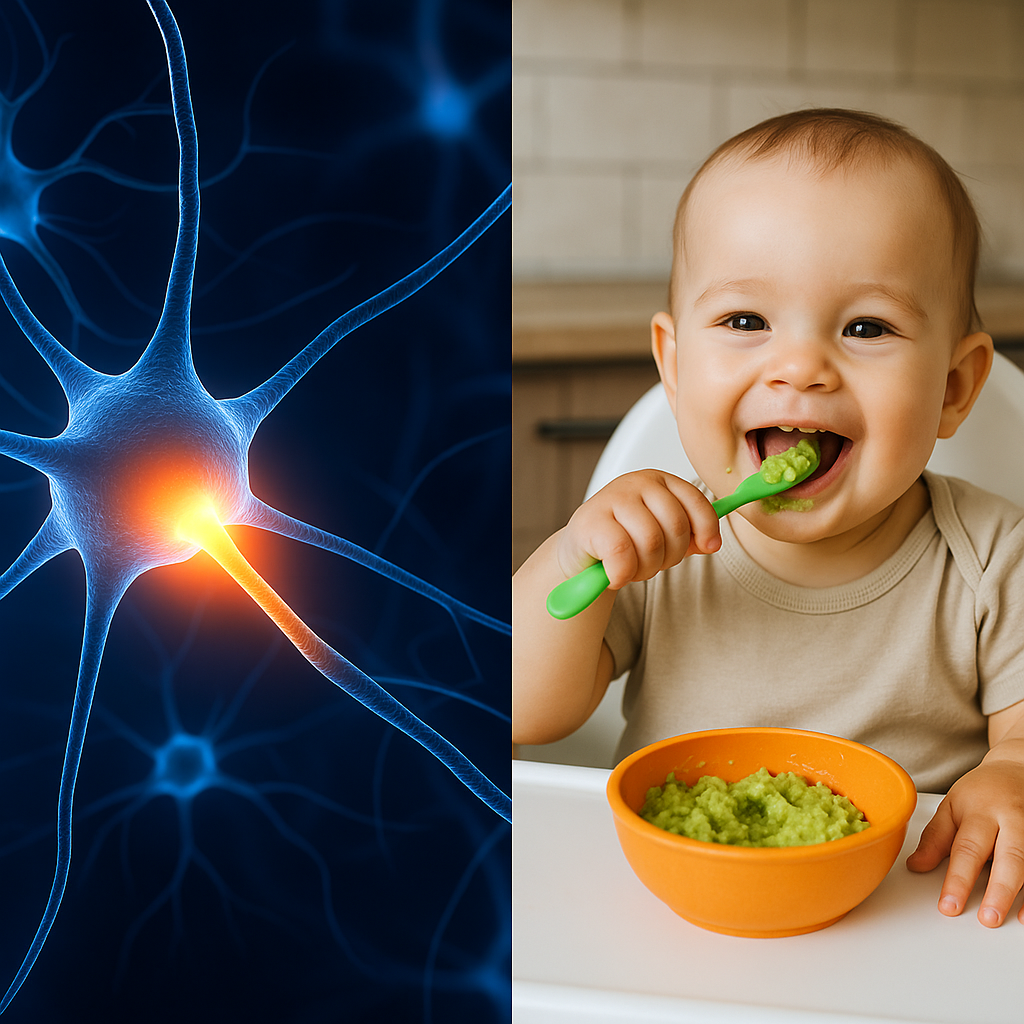By the end of the first year, a baby’s brain triples in size, and by age three, it reaches about 90% of its adult volume. This rapid growth involves the creation of billions of neurons (brain cells) and trillions of synapses (connections between neurons), which are essential for learning, memory, and cognitive function. Discover more on The Role of Nutrition in Brain Development: The Golden Opportunity of the “First 1000 Days” - PMC.
During these first 1,000 days, every meal supports rapid brain growth, forming over 700 new neural connections every second. As babies transition to solids, nutrient-rich foods support brain and motor skill development.
- How does early nutrition physically shape a baby’s brain?
- Which core nutrients deserve top priority for brain growth?
- Which animal-based foods super-charge little brains—and how do you cook them?
- Eggs: Why are two yolks a day a memory booster?
- Salmon & other low-mercury fish: How much is safe?
- Full-fat yogurt: Can dairy fuel thinking?
- Lean beef or dark-meat turkey: How do you sneak in iron?
- Liver: Why is this nutrient powerhouse a brain booster?
- Which plant-based foods pack cognitive power for babies and toddlers?
- Leafy greens: How do you make spinach irresistible?
- Beans & lentils: Can budget foods build brains?
- Avocado: Why is this “first food” a fat superstar?
- Nuts & seeds: How do you avoid choking?
- Berries & whole grains: Do antioxidants and steady carbs team up?
- How can parents adapt brain foods for allergies, vegan diets, or picky eaters?
- How do you serve these foods safely at each developmental stage?
- How can you minimize toxins and heavy metals in baby brain foods?.
- Your Top Questions, Answered
- Final Thoughts: Practical Implications and Recommendations
How does early nutrition physically shape a baby’s brain?
Brain development begins in the womb and accelerates after birth. Nutrition is critical during this period because the brain relies on specific nutrients to fuel its development as highlighted on: Nutritional Influences on Brain Development - PMC. These nutrients support processes like:
- Neurogenesis: The formation of new neurons, ensuring the brain develops sufficient cell numbers for complex functions.
- Myelination: The insulation of nerve fibers to speed up signal transmission.
- Synaptogenesis: The creation of synapses, or connections between neurons, forming the basis for neural networks.
- Neurotransmitter Production: Involved in synthesizing neurotransmitters, which are chemical messengers enabling neuron communication.
- Protection Against Oxidative Stress: Protect brain cells from damage, maintaining neuronal health and supporting overall brain growth.
Breast milk naturally supplies DHA, immune factors, and just-right macronutrients. Fortified formulas try to match these advantages—see Breast Milk vs. Formula for a deep dive.
Enriched solid foods add the “construction supplies” breast milk alone can’t cover forever—link new textures to brain-training hand-to-mouth motions.

Which core nutrients deserve top priority for brain growth?
The American Academy of Pediatrics Starting Solid Foods - AAP highlights 10 micronutrients that drive cognition:
| Nutrient | Role in Brain Development | Critical Period |
|---|---|---|
| Omega-3 | Builds myelin, cell membranes | Mid-gestation to 2 years |
| Choline | Supports memory, neurotransmitter | Late gestation, early infancy |
| Iron | Delivers oxygen, neurotransmitter | Pregnancy, first 12 months |
| Folate | DNA synthesis, cell division | Pregnancy, early infancy |
| Iodine | Regulates brain via thyroid hormone | First trimester, early infancy |
| Vitamin A | Cell differentiation, vision | Pregnancy, early infancy |
| Vitamin D | Potential role in brain development | Pregnancy, early infancy |
| Vitamin B6 | Neurotransmitter synthesis | Pregnancy, early infancy |
| Vitamin B12 | Forms myelin, supports blood cells | Pregnancy, early infancy |
For an in-depth chart, visit 7 Essential Nutrients for Your Baby’s Brain and Iron Deficiency in Babies.
Which animal-based foods super-charge little brains—and how do you cook them?
Animal-based foods deliver concentrated nutrients for brain development. Here are five options with simple recipes:
Eggs: Why are two yolks a day a memory booster?
Two fully cooked eggs meet 100% of choline needs for children under 8, plus protein and vitamin D. See Choline Fact Sheet.
Recipe: Quick Veggie Egg-Muffins (for ages 10 months+)
- Ingredients: 2 eggs, 2 Tbsp chopped spinach.
- Procedure: Whisk eggs with spinach, pour into a greased mini-muffin pan, bake for 15 min at 350°F (175°C).
Salmon & other low-mercury fish: How much is safe?
One ounce of flaked salmon twice weekly delivers DHA for sharper vision and language, plus vitamin D.
Recipe: Salmon-Sweet Potato Patties (for ages 10 months+)
- Ingredients: 1 oz cooked salmon, 2 Tbsp mashed sweet potato.
- Procedure: Mix, form bite-size patties, pan-sear 2 min per side.
Full-fat yogurt: Can dairy fuel thinking?
Iodine in yogurt supports thyroid hormones that regulate brain growth, plus calcium and protein.
Recipe: Berry-Chia Parfait (for ages 6 months+)
- Ingredients: ¼ cup plain yogurt, 1 Tbsp mashed blueberries, ½ tsp chia seeds.
- Procedure: Layer ingredients and serve.
Lean beef or dark-meat turkey: How do you sneak in iron?
Beef provides iron for oxygen transport, plus zinc for neurotransmitter production.
Recipe: Slow-Cooker Iron Mash (for ages 8 months+)
- Ingredients: 4 oz beef, 1 cup diced sweet potato, ½ cup broth.
- Procedure: Cook 4 hours on low, blend to desired texture. Pair with vitamin C-rich mango cubes to boost iron uptake. Check more on Toddler Nutrition: How Year Two Diets Boost Brain Power.
Liver: Why is this nutrient powerhouse a brain booster?
One ounce of cooked chicken or beef liver weekly provides choline, iron, vitamin A, and B vitamins, supporting memory and neural growth. Use sparingly to avoid vitamin A excess. Discover more on the Liver as a Nutrient-Dense Food.
Recipe: Liver-Potato Puree (for ages 8 months+)
- Ingredients: 1 oz cooked chicken liver, ¼ cup mashed potato, splash of breast milk.
- Procedure: Blend until smooth, serve 1-2 Tbsp for 8-12 months or spread on toast for toddlers.
Which plant-based foods pack cognitive power for babies and toddlers?

Plant-based foods deliver essential nutrients for brain growth. Here are five options with easy recipes:
Leafy greens: How do you make spinach irresistible?
Spinach provides folate for DNA synthesis, plus vitamin K for brain cell health.
Recipe: Spinach-Banana Puree (for ages 6 months+)
- Ingredients: 1 cup steamed spinach, ½ banana, splash of breast milk.
- Procedure: Blend, freeze in ice-cube trays, add to morning oatmeal.
Beans & lentils: Can budget foods build brains?
Two Tbsp lentils give 7% of a baby’s daily iron, plus fiber for gut health.
Recipe: Red-Lentil Coconut Dhal (for ages 6 months+)
- Ingredients: ½ cup red lentils, 1 cup coconut milk, pinch turmeric.
- Procedure: Simmer until soft; puree for infants or serve thick for toddlers.
Avocado: Why is this “first food” a fat superstar?
Rich in monounsaturated fats and choline for memory support.
Recipe: Avocado-Banana Mash (for ages 6 months+)
- Ingredients: ¼ avocado, ¼ banana.
- Procedure: Mash for spoon-feeding or spread on toast strips for baby-led weaning.
Nuts & seeds: How do you avoid choking?
- Sunflower seed butter provides zinc and alpha-linolenic acid (ALA) for neural growth.
Recipe: Sunflower-Oatmeal Swirl (for ages 8 months+)
- Ingredients: 1 tsp sunflower seed butter, 3 Tbsp oatmeal.
- Procedure: Swirl into warm oatmeal; thin with water until drip-off-the-spoon smooth.
Berries & whole grains: Do antioxidants and steady carbs team up?
Blueberries protect neurons with antioxidants; oats deliver sustained glucose.
Recipe: Overnight Brain Oats (for ages 8 months+)
- Ingredients: 3 Tbsp oats, ¼ cup breast milk, 2 mashed blueberries.
- Instructions: Soak overnight in a jar; serve cold or warmed.
How can parents adapt brain foods for allergies, vegan diets, or picky eaters?
• Egg allergy? Use a tofu-spinach scramble for choline.
• Fish-free family? Offer algae-oil–fortified milk or a chia-hemp pudding for plant omega-3s.
• Nut-free homes? Rely on pumpkin and hemp seeds for zinc and ALA.
• Picky eater? Blend greens into egg muffins or run a “rainbow smoothie” challenge—kids sip and guess colors.
Compare more swap ideas in Homemade vs. Store-Bought Baby Food.
How do you serve these foods safely at each developmental stage?
Start smooth, end mixed.
| Age Group | Texture | Serving Size |
|---|---|---|
| 6-8 months | Thin purees | 1-2 Tbsp |
| 8-10 months | Mashed or shredded | 2-3 Tbsp |
| 10-12 months | Soft finger strips (¼-inch wide) | 3-4 Tbsp |
| Toddlers (1-3 years) | Mixed textures, family meals | ¼-½ cup |
Safety Tips:
- Introduce one new food every 3 days, watch for allergies.
- Thin nut butters, shred greens, debone fish.
- Supervise closely during self-feeding.
- Ensure soft textures to prevent choking. |
How can you minimize toxins and heavy metals in baby brain foods?.
- Rotate Grains: Mix oats, quinoa, and barley to reduce rice arsenic exposure.
- Choose Low-Mercury Fish: Salmon, cod, and shrimp are safer than tuna Omega-3 Fatty Acids.
- Peel & Rinse Veggies: Reduces soil-borne lead.
- Use Safe Cookware: Stainless steel or cast iron prevents metal leaching. Dive deeper in Toxins in Baby Food: How to Protect Your Baby’s Brain.
Your Top Questions, Answered
-
How many eggs per week are safe?
Up to one egg a day (about seven per week) is considered safe once allergens are ruled out. Offer fully cooked and watch for reactions. -
Do healthy eaters need supplements?
Usually not. Breastfed infants need vitamin D drops, and vegan kids may need B12 or DHA—check with your pediatrician. -
Can I freeze these recipes?
Yes. Purées, muffins, and lentil dhal keep for three months in a ‑0°F (-18°C) freezer. Thaw overnight in the fridge, not on the counter. -
Is buying organic necessary?
No. Nutrient levels are similar; focus on variety, safe prep, and seasonal produce over labels. -
When should I introduce solid foods?
Around 6 months, when babies show readiness (sitting up, head control). Start with single-ingredient purees (First Foods).
For more starter tips, see Best First Foods for Your Baby’s Brain.
Final Thoughts: Practical Implications and Recommendations
For parents, ensuring adequate nutrition during pregnancy and early childhood is crucial. Pregnant women should consult healthcare providers for dietary guidance, aiming for the recommended weight gain to support fetal brain growth. Postnatally, breastfeeding is optimal, with the introduction of iron-rich foods or supplements after six months to prevent deficiency. For formula-fed infants, selecting iron-fortified formulas is advised to meet nutritional needs.
Monitoring for deficiencies, such as maternal iron deficiency (affecting over 15% of U.S. women of childbearing age), and addressing food insecurity (16 million U.S. children in food-insecure households) are essential steps. Read more on The Role of Nutrition in Brain Development: The Golden Opportunity of the “First 1000 Days” - PMC.
In conclusion, early nutrition physically shapes a baby’s brain by providing the necessary building blocks for its structure, connectivity, and function. Adequate intake of key nutrients during critical periods ensures optimal brain development, while deficiencies lead to lasting cognitive and structural impairments, underscoring the importance of nutritional care in early life.